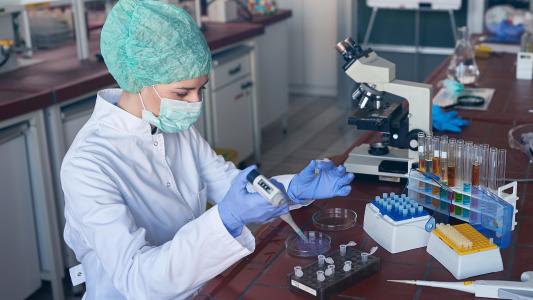Colorado’s San Miguel County has teamed up with biotech company United Biomedical Inc. (UBI) on a first-of-its-kind coronavirus antibody testing project.
If the project goes as hoped, it could ensure life in places disrupted by the COVID-19 outbreak returns to normal as soon as possible.
Coronavirus Antibody Testing
When an antigen — a virus, bacteria, etc. — infects a person, their immune system produces antibodies specifically designed to help the body fight that particular antigen.
That means that if a person’s blood contains coronavirus antibodies, they must have already been infected by the virus and recovered, even if they never tested positive for it or expressed any symptoms.
It also means they are likely now immune to the virus — at least temporarily — and don’t have to worry about catching it.
At the same time, antibody testing can improve the accuracy of mortality rates by helping researchers identify the actual number of coronavirus cases, and not just the ones identified following the appearance of symptoms.
“Antibody testing is the fastest path of getting to a new normal.”
Lou Reese
UBI had developed an antibody testing kit for SARS in 2004, so soon after the COVID-19 outbreak began, it started developing a kit for the new coronavirus.
It later validated the test using samples from 47 coronavirus patients in China and Taiwan. It also used samples from hundreds of people who weren’t infected by the coronavirus to ensure their test didn’t get confused by antibodies for other viruses.
UBI has already deployed approximately 100,000 of the kits, but mostly in Asia.
When deciding on a location for a U.S.-based antibody testing project, San Miguel County made sense, as two of UBI’s executives — married couple Mei Mei Hu and Lou Reese — live part-time in its largest town of Telluride. It’s also a very small county, with only 8,000 or so residents, making it more feasible as a pilot project.
San Miguel County officials, working with dozens of volunteers, have already begun collecting blood samples from residents at testing locations. They plan to continue that process through April 2 and then test each resident again after 14 to 16 days.
Herd Immunity to COVID-19
Like all Coloradans, residents of San Miguel County are under a stay-at-home order until at least April 11, meaning they aren’t supposed to leave their homes unless it’s to obtain medical care, buy supplies, or go to work.
If antibody testing can show that a large enough share of residents have already contracted it (usually estimated to be about 70% for COVID-19), that would be a sign that the community has herd immunity to the virus, meaning that so many people are immune that the virus can’t easily spread.
Alternatively, even if only a few people turn out to be immune, those immune people would be able to go back to work without worrying about spreading the infection.
Either way, that information could give officials the confidence that they need to lift movement restrictions, at least for some people, without worrying about worsening the outbreak.
“The goal of this is to show you can predictably get an entire county back to its new normal as quickly as possible by using testing,” Reese told ABC News, adding that “antibody testing specifically is the fastest path of scientifically and mathematically getting to a new normal.”
Right now, it seems the county is far from herd immunity — of the first 645 people tested, none had coronavirus antibodies in their blood.
However, Colorado isn’t the only place where health officials are exploring ways antibody testing of large populations could help bring the disruption of COVID-19 to an end.
The U.K. has placed an order for 3.5 million antibody testing kits, and Dutch health officials have launched a project expected to screen approximately 10,000 blood samples weekly for coronavirus antibodies.
Researchers in Germany are looking for funding to launch their own study involving 100,000 people.
Through that project, immune people could receive “immunity passports” or “vaccination passes” making them exempt from movement restrictions — meaning antibody testing might not just allow communities to return to normal as soon as possible, but individual people as well.






